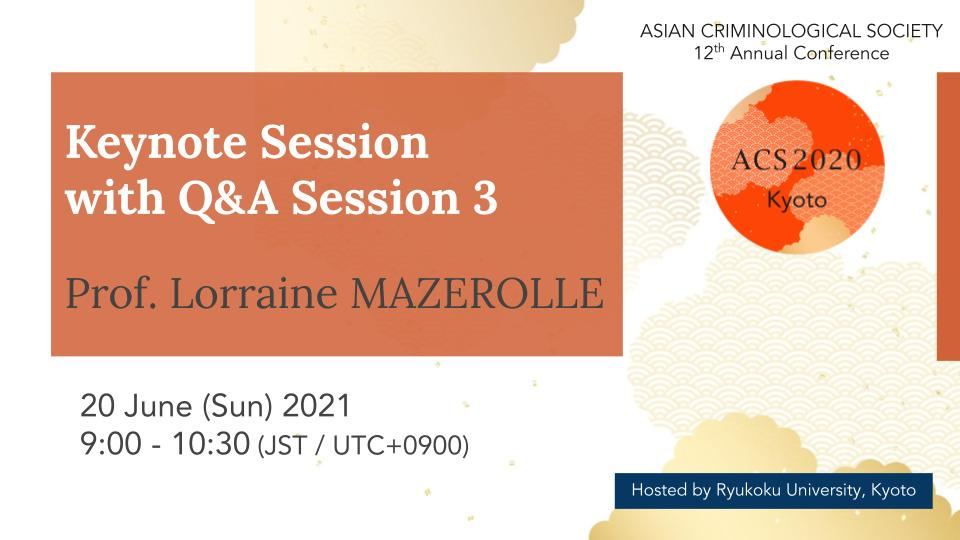2021.08.06
[Report of the ACS2020] Keynote Session with Q&A Session_Prof. Lorraine Mazerolle
Policing Health Regulations during the COVID-19 Pandemic: The Role of Procedural Justice Encounters in Maintaining the Rule of Law and Protecting the Population
The Asian Criminological Society 12th Annual Conference (ACS2020), hosted by Ryukoku University, was held online for four days from June 18 to 21, 2021. The purpose of the conference, the second of its kind to be held in Japan after the 2014 Osaka conference, was to promote the growth of criminology in Asia and Oceania, and to promote academic exchange with advanced regions of criminology such as the United States and Europe.
>> ACS2020 Program https://acs2020.org/program.html
The overall theme of the conference is "Crime and Punishment under Asian Cultures: Tradition and Innovation in Criminology". The aim was to promote understanding of the social systems and culture and measures against crime and delinquency in Japan, which is said to be "the country with the least crime in the world".
The following is a summary of the Keynote Session with Q&A Session, which was held live streaming at the conference.
- Keynote Speaker: Lorraine Mazerolle (Professor of Criminology, University of Queensland, Australia)
- Chair: Mitsuaki Ueda (Associate Professor, Institute for Advanced Research and Education, Doshisha University, Japan)
- Date: 9:00-10:30, 20 June, 2021
- Keywords: COVID-19 pandemic, Procedural justice, Police legitimacy, Public confidence


Lorraine Mazerolle (Professor of Criminology, University of Queensland, Australia)
The COVID-19 pandemic has clearly escalated the complexities of policing, creating a range of new responsibilities, tasks and strategies for police as well as raising new accountability questions. In this presentation I examine a number of new health regulations that are now commonplace for police to enforce including: restrictions on the number of people in restaurants, limits on visits to aged care and private homes, maintaining physical distancing between people in public space, and mandated wearing of masks. I explore the application of procedural justice policing to these new tasks, public demands, and strategies. I conclude that the pandemic has created unprecedented access for police into the private lives of citizens creating a new set of opportunities for enhancing citizen perceptions of police legitimacy but only under conditions of procedurally fair approaches to citizen engagement.
Summary of the Q&A Session
Question 1: Since the spread of the COVID-19 outbreak, has police legitimacy decreased due to issues related to police impartiality, as typified by Black Lives Matter? Also, during this period, did public confidence in the police increase or decrease?
Answer 1: Within Australia, police legitimacy seems to be on the rise. The police in Australia do not take a hard line on public health issues and work very well with the community. For example, instead of cracking down on people who are violating the requirement to wear masks, they hand out masks on the spot, and very few people have actually been fined. Also, although this is only in Australia, the research has shown that public confidence in the police has increased.
Question 2: How does procedural justice increase cooperation by citizens?
Answer 2: Our research has shown that the most important element of policing in terms of procedural justice is giving citizens a voice. Treating citizens with dignity and respect, taking a neutral stance in decision-making, and making sure that the subject understands that he or she is not being targeted for policing are equally fundamental elements, but giving citizens a voice is at the root of it. This is illustrated for example by taking the stance of asking people if there is something wrong with them, rather than being coercive, such as indicating the possibility of a fine to someone who is not wearing a mask for example.
Question 3: Does the degree of public confidence vary across groups?
Answer 3: We cannot answer this question with the data we have, but there is definitely a difference. The results of other studies we have conducted show significant differences by ethnic background.
Question 4: What is the direction of causality among the concepts of procedural justice, police legitimacy, and public confidence?
Answer 4: Although it has been shown that these concepts are interrelated, the mechanism by which they are established is unclear. This is an important research topic that should be addressed through experimental and longitudinal studies that can take into account time series. However, this does not mean that policing should be underestimated. Police can be effective in their practice by treating citizens with dignity and respect, and by building public trust and confidence in themselves.